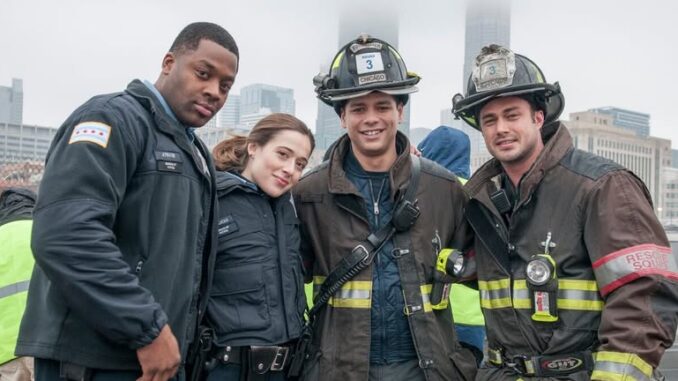
The One Chicago franchise has become a staple of NBC’s programming — a reliable powerhouse of high-stakes drama, emotional storytelling, and character-driven narratives that span firehouses, emergency rooms, and police precincts. So when NBC recently announced that Chicago Fire, Chicago Med, and Chicago P.D. have all been renewed for another season, fans had every reason to celebrate.
But the joy of renewal has been quickly tempered by some sobering news. Alongside the confirmation of new seasons came two unsettling developments: the seasons will be shorter, and significant cast cuts are expected. For long-time viewers, this signals more than just a scheduling adjustment — it points to a turning point that could reshape the future of the entire franchise.
Yet, fans hoping for a full slate of 22 episodes, as in the golden years of the franchise, are in for a disappointment. Sources close to production have confirmed that each show is likely to receive around 13 episodes for the upcoming season. That’s nearly a 40% reduction from the usual format. Fewer episodes mean less screen time for beloved characters, faster storylines, and ultimately, fewer opportunities for deep, emotional arcs that require time to breathe.
The shorter seasons aren’t arbitrary. They’re part of NBCUniversal’s broader cost-cutting strategy in the post-strike entertainment landscape. After the dual writers’ and actors’ strikes of 2023, networks and studios have had to tighten their belts. Budgets are being restructured, high-salary contracts are being re-evaluated, and production timelines are being adjusted to accommodate leaner seasons and more cost-efficient storytelling. Unfortunately, that cost-efficiency is also coming at the expense of the cast. Insiders have confirmed that multiple long-running cast members across all three shows may not return next season, either due to contract non-renewals or narrative decisions aimed at streamlining production.

While NBC and Wolf Entertainment have not officially named which characters are being written out, speculation is already running wild. On Chicago Fire, fans are watching closely to see who might exit next following Kara Killmer’s recent departure as Sylvie Brett. Her absence has already been a major shakeup for Firehouse 51, and more exits could further destabilize the team dynamic.
On Chicago P.D., Tracy Spiridakos has confirmed that Season 12 will be her last as Detective Hailey Upton. That alone marks a major loss for the Intelligence Unit, especially given how much emotional weight Upton has carried since Jay Halstead’s exit. But with the rumored budget cuts, could more exits from the Intelligence team be imminent?
A shorter season and a smaller cast don’t just change what we see on screen — they change how the story is told. The beauty of the One Chicago universe has always been its ability to balance intense plotlines with deeply personal character development. With fewer episodes, writers will be forced to trim subplots and accelerate arcs that might have previously taken half a season to unfold.
This could mean fewer crossover events — a signature hallmark of the One Chicago brand. Crossovers require time, logistical coordination, and narrative breathing room. With less of all three, it’s likely that those big, universe-connecting episodes may be rare, if not temporarily shelved. Moreover, the emotional depth that fans love — the lingering grief after a teammate’s death, the slow-burn romance, the philosophical battles between characters like Voight and Upton — all risk being watered down in a tighter production framework.
Now, the question is whether that same loyalty will hold in the face of reduced content and fewer familiar faces. Can a 13-episode season maintain the same level of engagement and emotional resonance? Can new characters introduced in a tighter format connect with viewers the way long-time cast members have?
Despite the challenges, there may also be opportunities here. A shorter season could lead to tighter writing, less filler, and more focused character arcs. It might force the writers to take more creative risks, deliver bolder stories, and break out of some of the franchise’s well-worn tropes. After 12+ seasons, that kind of creative refresh might not be such a bad thing. In addition, new cast members could bring fresh energy to each show. If selected wisely and written with care, these new characters could offer surprising new dynamics that enrich rather than dilute the ensemble. The key will be execution — and respecting the emotional investment fans have made over the years.
